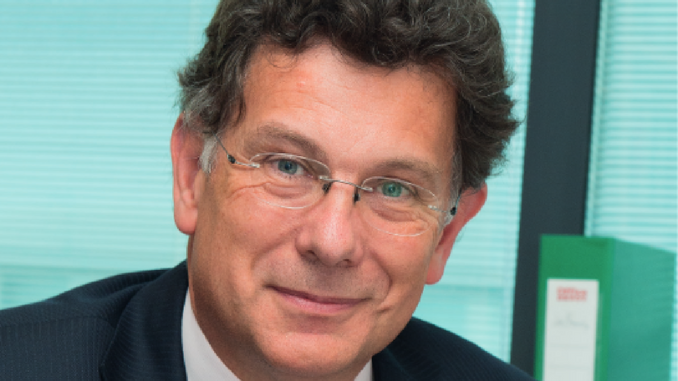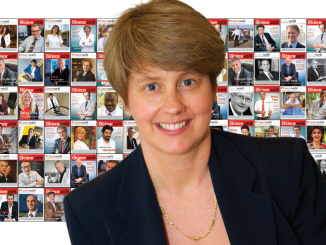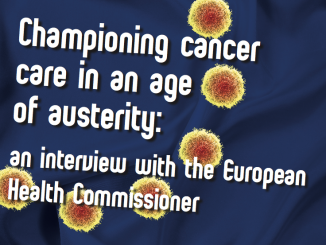
We wont improve cancer care until we know more about how well we are doing and how alternative approaches compare. It sounds obvious, but its not happening, says the real David Cameron
Something in the cancer world doesn’t add up. The influential medical oncologist who voices the sentiment is a mathematician by background, so he should know.
Unlike his namesake the British Prime Minister, Professor David Cameron (known to friends as “the real David Cameron”) is troubled by politics – the way it overrides the cool, research-based assessments of data that could improve patient care. Politics gets in the way of good health.
It isn’t that this particular Cameron shuns the corridors of power. In fact, he’s been at the heart of government-directed initiatives, and has made it a career credo to combine research with management. He is currently Professor of Oncology at the University of Edinburgh and Director of Cancer Services for NHS Lothian (in Scotland) – a role combining the academic with the service-centred. Before that, between 2006 and 2010, he was Director of the English National Cancer Research Network – a government initiative to support clinical research within the National Health Service, and to integrate it better into cancer care services.
And as a member of the government-commissioned UK Panel on Breast Cancer Screening, he tried to reconcile divergent views on screening’s relative risks and benefits. Reporting in the Lancet in October 2012, the panel concluded that screening reduces breast cancer deaths, but at the cost of over-diagnosis – the extent of which is uncertain given current data.
But being in the political thick of it has made him realise how badly skewed top level decision-making can be: “There are a number of political initiatives in the UK to try and improve health services where building in evaluation isn’t even part of the process,” he says.
“The attitude is: ‘Come up with a better way of doing things, and we’ll give you the money.’ But if you respond that you need to have the data to show you the best way, the answer is: ‘No, sorry, you have to know the answer or you don’t get the money.’ That’s what we keep doing wrong, and there’s some education needed. Health systems will never be perfect as long as people keep tweaking and changing rather than seriously asking the right questions about the best ways of delivering care.”
Lack of data is deeply worrying to a man who trained and practised as a maths teacher before deciding to go into medicine at the age of 24. He’s a firm advocate of the National Health Service in the UK, but it frustrates him that the collection, analysis and effective use of information is not central to everything health service managers and clinicians do – not just in the UK, but all over the world.
“People tend to see research as some sort of luxury extra which is owned by universities or drug companies,” he says. “But there’s clear evidence that embedding research into clinical care improves patient outcomes. Research is a core part of what we should all do, and I don’t just mean drugs trials, or even randomised controlled trials. I mean a deep and thoughtful process which evaluates what we do, and uses research methodology to find ways of doing things better.”
“How do you implement the right developments? For treatments, you learn from randomised controlled trials, you follow the patients up to answer questions. We should do the same for health services. How do we really know the outcomes for patients at a centre which claims to be a world leader? Show us the data, as you would in a clinical trial, indicating that your patients do better than anyone else. This is missing from the assessment of quality delivery all over the world.”
Cameron is involved in some of the most important trials of breast cancer drugs. He is the UK chief investigator of the APHINITY study with pertuzumab, the EORTC LAPATAX trial, the multinational adjuvant BEATRICE trial, the UK TACT2 adjuvant breast cancer trial. He has been involved in the data safety monitoring boards for several advanced breast cancer trials.
But he acknowledges there is a problem: around 85% of the clinical trials within the National Cancer Research Network in the UK focused on questions about drug treatments. Why isn’t there more research into other areas? Two reasons, he believes. One, because funding for drug studies is much more easily available from commercial companies wanting to prove a new product. Two, because drug studies are usually easier to do than other types of research.
“Could you run a randomised controlled trial to find out whether moving surgical treatment for less common cancers into fewer centres brings better outcomes? Some of the methodologies we use in clinical research for drugs trials don’t naturally lend themselves to health services research. So I think one of the issues is that the methodological approaches required are more difficult, and the second is who’s going to fund them. Apart from Health Technology Assessment programme in the UK, the Institut National du Cancer in France, who else in Europe will fund high-quality, methodological type research about the way we deliver healthcare services?”
What’s needed is a recognition from those who commission health care services – insurance companies, politicians, managers – that research and evaluation is integral to good care, and ultimately good value for money. But currently, their understanding of this appears weak.
Those who worry that embedding research into all health services is simply too expensive are looking at the problem in the wrong way, he says. The English government, he points out, spent approaching £1 billion (€1.2 billion) on the recent National Health Service reorganisation. That is the same as the government’s allocation to supporting research within the NHS. If half the reorganisation money was instead spent on asking questions about the best ways to deliver healthcare, the research budget would be boosted by 50% and half a billion pounds would have been saved.
“There is enough money,” he concludes. “But politics gets in the way.”
These kinds of figures put the debates about ever-increasing bills for new cancer drugs into a different perspective. The subject of cost-effectiveness in cancer services is often dominated by drugs – which take up between 10% and 20% of cancer expenditure in many European countries. “My opinion is that this is probably one of the more minor areas where we need to examine cost-effectiveness,” he says. “People focus on it because it is easily measured. We make all sorts of other politically motivated changes which cannot be assessed with the same rigour. They may well be cost-effective, but we never ask the question.”
“We make all sorts of politically motivated changes which cannot be assessed with the same rigour”
For all his emphasis on logic and data, Cameron is no simple “bean-counter”. Born in Edinburgh, the son of an army officer (latterly a clergyman) and a teacher, he took a maths degree at Cambridge University, and then taught mathematics in schools for a couple of years. But he knew something wasn’t right: “I just didn’t see my future as a mathematics school teacher.” So he worked for a management consultancy firm for 18 months while he considered his options. “They were doing a lot of economic evaluations for infrastructure projects across the world – asking questions like: ‘If the cost of digging a 22-mile tunnel through the Alps is x million, what are the economic spin-offs?’ Maybe that’s where my interest in health economics comes from.”
In the end, however, he decided to go into medicine. He realised he needed personal involvement with people – something which maths and health economics could not provide. Medicine involved applying knowledge systematically, but also face to face contact with a person in need.
So he went to St George’s Medical School in London, spent two years as a junior doctor in London, then came to Edinburgh in 1989 to specialise in infectious diseases including HIV, and then switched to oncology. The area had much in common with HIV – the way patients are managed, balancing drug toxicity with efficacy, dealing with people who are dying. “Various options in infectious diseases had closed down for various reasons, and oncology just seemed to embrace all the areas that interested me.”
After completing a fellowship and MSc in Clinical Oncology at the University of Edinburgh, he received a MD with distinction in 1997. He took up administrative responsibility for medical oncology in his department in 2001. It was in 2003 that his career really began to multi-track, when he was appointed consultant and part time senior lecturer in medical oncology at the Western General Hospital, Edinburgh, and research programme lead for cancer with NHS Lothian, and clinical lead for the South East Scotland Cancer Research Network.
Between 2006 and 2009 he went to the University of Leeds, where he was Professor of Oncology and Director of the National Cancer Research Network. Then he came back to Edinburgh for his current dual role, dividing his time between managing cancer services for the NHS Lothian region, treating patients, and researching breast cancer.
His life and career have centred on the city of Edinburgh. He was drawn back there after Leeds not because it is beautiful or because of friends and relatives, but because of the nature of the job he was offered – one that matched his conviction that research and clinical work should be inextricably linked. “There’s such wonderful potential here,” he says. We are sitting in his office in the Edinburgh Cancer Research UK Centre, established in 2010 and run jointly by the University of Edinburgh, Cancer Research UK and NHS Lothian. He points outside the window: “The radiotherapy machines are just there. There aren’t that many cancer departments in the UK where you have basic science so close to the clinic. My job is built between two partners, the university and the health service, and their relationship is pretty good.”
“There’s been a commitment by the university to invest in cancer research – more on basic science than the clinical. So my job is to build the clinical research within cancer services, and there’s a commitment from NHS Lothian to do this. So the bricks that you need are here.”
What really shaped his career, he says, and influenced his beliefs and priorities as an oncologist and researcher, have been teachers and colleagues. Bob Leonard, who Cameron worked with in Edinburgh, taught him about the importance of seeing the patient as well as the scientific facts; biochemist Bill Miller taught him to be methodical and beware any assumptions during research; John Smyth from Edinburgh University helped him understand the political side of oncology services. “All three believed fundamentally in clinical research,” he says. When in Leeds, Peter Selby taught him the value of data in understanding services and how to improve them.
As one of the UK’s leading researchers in breast cancer, Cameron was selected by the UK’s National Cancer Director in 2012 to join an independent panel investigating the effectiveness of breast screening. This was in response to years of high profile, sometimes heated, debate in the UK and widespread concern that the information given to women before screening didn’t help them make informed decisions.
The panel reviewed all available research and concluded that breast screening extends lives – the best evidence points to a 20% reduction in mortality in women invited to screening. But, due to lack of evidence, the panel was less categoric about the negative effects on women’s wellbeing that might result from “overdiagnosis” and treatment of cancers found by screening that might ultimately never have led to their death – ductal carcinoma in situ in particular. Estimates of overdiagnosis vary from 0% to 50% (see also The Cruellest Cut, p28).
What does this mean for breast screening programmes elsewhere, particularly in countries currently considering one or in the process of setting one up? Does it constitute a recommendation that all countries should push ahead with national screening?
Cameron is cautious. The review, he says, was designed to look at an existing programme within the context of the UK population and UK breast cancer characteristics. It didn’t attempt to ask the question of whether there was evidence that other countries should set up a programme, especially given variations in breast cancer characteristics from country to country. But he sees no evidence to suggest that other countries with similar breast cancer characteristics and demographics to the UK should not set up a similar screening programme.
“However, I don’t think you can assume the same balance between benefits and overdiagnosis in every country,” he says. “In Turkey, for example, the median age for breast cancer is 50, and here it’s 62. If you want to screen under the age of 50 [in the UK screening begins at 50] you’re going to need to run a randomised trial, because we don’t have evidence that screening under the age of 50 is effective.”
As Chairman of the EORTC Breast Cancer Group, Cameron is keen that international dialogue continues on breast screening, particularly on the kind of information that women should receive before they are screened.
“We also need to understand better whether it’s possible to identify those cancers picked up by screening that we don’t need to treat,” he says. But putting your finger on these “less dangerous” types is not easy: working out whether a cancer is unlikely to be life-threatening for an individual involves not just crunching some population-based probabilities, but knowing the probability for a particular person’s biology. “At the moment, we don’t understand enough about the genetic drivers,” he says.
The hour allocated for our interview is nearly up – Cameron has managed to squeeze me in between two important NHS meetings, called at short notice. I want to return to his concerns about the lack of research in and about health services. What is the way ahead?
“At a European level we should be asking questions about the quality of healthcare we deliver. The data exist to measure it, but we never pull it together properly.” He points out that many European countries don’t even have a comprehensive cancer registry, even though all the relevant data are sitting somewhere in computer files. “More and more complex data about cancer patients and the effectiveness of their treatment is going to become available as the genomic era progresses. But we risk drowning in the data unless we work out ways to use it – with all the right security and ethics – to answer bigger questions.”
“We need to ask questions about the quality of healthcare we deliver”
So how is that achieved? One barrier at the moment is the concern that patient confidentiality will be compromised if personal records are fed into larger databases. There has been outrage in some sections of the British press this year about government plans to create a central database of patient records, from which data might be sold to private companies.
“We’re going to have to build ways of collaborating so that data is pulled together in systems which have the right governance,” he says. “There have to be safeguards to confidentiality, but they shouldn’t be barriers. Then you can start to answer questions about how different treatments affect different subgroups of patients. As you bring in more and more genomic data, you can look at which genomic differences are important. For the less common cancers, you may need to pull together data from several European countries.”
“However, people will need a lot of reassuring that that they’re not going to be open to political or legal challenge.”
The other big challenge facing the cancer community is the cost of cancer drugs, he says. This is a common concern among oncologists in the UK, but it is intriguing in Cameron’s case because he has also publicly criticised the fact that newer, expensive cancer drugs are not available to patients in some parts of the UK. He explains that his problem is inconsistency: in a supposedly national health service, a drug that has been judged cost-effective by national bodies such as the National Institute for Health and Clinical Excellence should be available in every part of the country.
But the fact remains that new cancer drugs are very expensive, and health systems are struggling to afford them. “We don’t want to destroy the capitalist system of drug development which seems to work quite well. But we need to reduce the cost of developing new drugs so that drug companies no longer charge so much to cover their costs, and therefore the price to the payer can be brought down.”
“I’m not sure I understand the solution, but I am seriously worried that the costs of new drugs are escalating, and it won’t be just the UK that starts to struggle. There are going to have to be some complex high-level discussions – a dialogue between the companies that develop the drug, the payers, the health economists, the clinicians and the patients. This is a problem for all of us, and everyone needs to get round the table. We’re very bad at doing that.”
“The costs of new drugs are escalating. This is a problem for all of us, and everyone needs to get round the table”
It’s time for his next meeting. He whisks on his jacket, guides me out of the Cancer Research UK Centre, says goodbye, and disappears through the door of a neighbouring building consulting his papers. I imagine him at the meeting, and perhaps every meeting, telling his colleagues, whether they be clinicians or managers: “Show me the data.”





